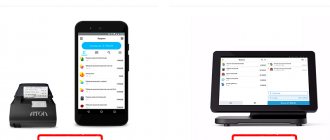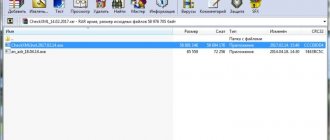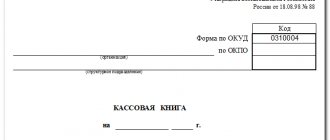Inspectors check: the correctness of the use of cash registers, compliance with law 54-FZ and the requirements for recording revenue.
The tax office can monitor compliance with the law on the use of online cash registers using:
- analysis of calculations through the automated system of the Federal Tax Service. It also allows you to analyze incoming fiscal data;
- remote verification of the operation of cash register systems, completeness of revenue accounting, verification of the activities of the OFD at the location of the tax authorities and request for explanations, certificates, information and documents;
- monitoring the use of cash register systems when selling goods, services, and works to buyers with the involvement of witnesses;
- control purchase, to verify the execution and issuance of cash receipts and other documents that confirm payment. The purchase is carried out by inspectors. They buy a product, purchase a service or work, make a payment in cash or electronic money.
Checking the online cash register: legal grounds
The tax inspectorate, like any public service, operates in accordance with the law. Control of the operation of online cash registers by tax inspectors is carried out on the basis of the following documents:
- Order of the Ministry of Finance No. 132n dated October 17, 2011 - defines the regulations for the stages of equipment inspection;
- Law No. 943-1 of March 21, 1991 - limits the powers of tax representatives;
- Federal Law No. 294-FZ of December 26, 2008 - presents a list of rights of business representatives when conducting an inspection of online cash registers.
Control technologies differ in type and form. In appearance they are planned and unscheduled, in form - documentary and on-site. Documentary verification involves identifying compliance of company documentation with established standards. At the same time, representatives of the Federal Tax Service do not visit the company directly, but request documents according to the list. An on-site inspection is an inspector visiting the company’s office.
Expert opinion
Irina Smirnova
Online checkout expert
Ask a Question
Unscheduled inspections are usually carried out based on complaints received from customers. The planned audit is carried out in accordance with the official priority list of enterprises. To do this, the company must be included in the register of scheduled inspections. Most often, such lists are compiled a year in advance.
The cashier's name is not indicated on the receipt or does not match
Everything is leading to the fact that the cashier must be officially employed and contributions and personal income tax must be paid for him. The inspectors will compare the seller's name with that indicated on the check. It is possible that verification of official employment will be carried out automatically, since a new requisite will be added - the cashier’s TIN. Quite a few nuances and questions will appear here. For example, what to do if the employee is on a probationary period or there is a high turnover of staff? Do you really have to reprogram the cash register every time?
Important.
If the above requirements are not met, you will most likely have to pay two fines - from the Federal Tax Service for incorrect details, and from the Labor Inspectorate for an unregistered employee (Clause 4, Article 5.27 of the Administrative Code. Fine - from 5 to 10 thousand rubles).
What exactly does the tax inspector check?
Representatives of the tax service monitor the activities of commercial organizations in two areas: they identify compliance of the online cash registers used with the requirements of Federal Law No. 54-FZ and check compliance with the rules for using the equipment. The following indicators are subject to verification:
- accounting of transactions carried out using cash registers;
- technical compliance of the online cash register with current legislation;
- compliance with the rules for working with OFD;
- compliance with the rules for issuing checks.
These are the main topics; they interest the inspection service only superficially. A deeper inspection begins when violations are discovered.
Expert opinion
Kirill
Cashier specialist
Ask a Question
Remote control of the online cash register via the Internet is possible. To do this, the responsible representative of the Federal Tax Service analyzes documents received from the fiscal data operator (FDO). In this way, many suspicious facts from the life of the organization are revealed, and periods of non-use of online equipment are also taken into account.
How to avoid fines from the Federal Tax Service
- Make correction checks
. For each incorrect transaction with a breach, issue correction checks (letter of the Federal Tax Service dated December 7, 2017 No. ED-4-20/24899). - Report violation
. If you warn the Federal Tax Service about an error in working with cash registers and attach the necessary documents, then there will probably be no fine. It is better to send such applications in a postal envelope or give them in person at the inspection. - Ask to replace the fine with a warning
. Try writing a petition to the inspectorate to replace the received fine with a warning (Clause 1, Article 4.1.1 of the Administrative Code). This can be effective if the offense was primary. - You can sue
. If you disagree with the fine, you can go to court and try to cancel the fine altogether or ask to replace it with a warning.
Now you know that if a tax audit of a cash register resulted in a fine, you can try to replace it with softer measures of the Federal Tax Service.
Return to list
Powers of a tax inspector
When conducting an audit, the tax authorities must provide the responsible representative of the company with a correctly completed decision to conduct an audit. The document contains a list of issues to be studied.
As part of the inspection, inspectors have the right to:
- provide unhindered access to cash register equipment (CCT);
- study the fiscal data storage;
- check cash documents;
- receive clarifications, reference information and other information related to the operation of the cash register;
- conduct test purchases to check the cashier’s ability to operate equipment;
- involve law enforcement officers in the inspection;
- check contracts with OFD;
- check the correctness of execution and issuance of documents by the online cash register;
- raise the issue of bringing enterprise employees to administrative and criminal liability.
Expert opinion
Irina Smirnova
Online checkout expert
Ask a Question
The management and staff of the company do not have the right to interfere with the inspectors. The best solution during the inspection will be to listen carefully to the representative of the Federal Tax Service and eliminate the shortcomings as quickly as possible. In this case, all procedures will end not only easily, but also without negative consequences.
Checking documents on cash registers
This procedure is carried out openly with tax service employees presenting instructions to cash register users to carry out an audit and their official IDs. When conducting an inspection, inspectors consider:
You can find more complete information on the topic in ConsultantPlus. Free trial access to the system for 2 days.
- cashier's log;
- acts on the return of funds to clients;
- printouts of reports from fiscal drives;
- strict reporting forms and other documents;
- cash register passport, agreement with the fiscal data operator, documentation related to the acquisition, registration, repair, modernization of equipment, replacement of fiscal drives.
The list is given in paragraph 34 of the Regulations.
Note! The requested documents are submitted by the cash register user in the form of originals or certified copies. At the same time, inspectors cannot require notarization of copies of documents.
How is the online cash register checked?
At the beginning of the audit, the tax inspector conducts two anonymous test purchases: for cash and by bank transfer. In addition, it generates two checks: paper and electronic.
Next, it launches the Federal Tax Service mobile application and checks the received documentation for correctness. Thanks to this, the inspector can quickly verify the financial integrity of the company. If an authorized employee of the Federal Tax Service wants to check the work and qualifications of the cashier, he may ask to issue a refund.
When checking the use of an online cash register, the design of the equipment is carefully studied. They check the presence of the model in the state register, check the presence of seals, the overall integrity of the device, and compliance with technical requirements. Then they check the revenue recorded by the cash register.
Next, the documentation is checked. If tax representatives are on the premises of the company, they confiscate the original documents. If the procedure is carried out at a local branch of the Federal Tax Service, it would be better to provide copies of papers for control.
The following are subject to verification:
- strict reporting forms and checks;
- daily reports;
- invoices;
- cash book.
The inspector may even make a complaint about the quality of document printing. Blurred letters, unclear font, and unnecessary elements on a receipt can confuse not only the tax authorities, but also the company’s clients. Therefore, it is strongly recommended to monitor the condition of the printer, refill cartridges in a timely manner, and carry out maintenance of printing equipment. Paper and electronic checks are checked for the presence of details established by the standards.
These include:
- Business name;
- shift check number;
- Full name of the cashier;
- details of the product or service (name, quantity, cost);
- VAT rate and amount;
- payment method;
- cost of goods with costs and allowances, including discounts and promotions;
- QR code containing information about the document;
- FN serial number;
- CCP number issued upon registration with the Federal Tax Service;
- TIN of the enterprise;
- company tax form;
- address of the retail outlet where the sale was made;
- date and time of the operation;
- shift number;
- fiscal factor and check serial number.
All details must be located strictly in the places designated for them, clearly visible, without any defects or inaccuracies. Otherwise, the inspector has the right to reject the document and fine the company.
If the inspector is going to pick up any documents, this must be done strictly according to the inventory, signed by both parties. At the end of the inspection, an authorized employee of the Federal Tax Service prepares a report in two copies.
Expert opinion
Irina Smirnova
Online checkout expert
Ask a Question
The document contains a list of violations and penalties imposed, facts of disagreement of representatives of the company that was subject to inspection. One copy is sent to the tax office, and the other remains at the disposal of the company. The results of the inspection can be disputed within 10 days from the date of completion.
Failure to send a copy of a check electronically
If the buyer asked to send him a copy of the receipt electronically to his phone or e-mail, then this must be done! However, the client must contact the cashier before payment (Clause 1, Article 1.2 of Law No. 54-FZ).
An electronic copy of the check can be presented in two forms: SMS and/or email. In both cases, some technical capabilities are required. Moreover, if they are absent, you don’t have to send a check by email, since not all cash desks support the characters included in the address name. But to send SMS you will need the help of the OFD. Typically this option is paid and is available upon request.
How to register a cash register with the tax office via the Internet
To submit an application online, you must be registered on the official website of the Federal Tax Service and have an enhanced qualified electronic signature (UKES). To register an online cash register with the Federal Tax Service for tax purposes, you must complete the following steps:
- 1. Log in to your personal account,
- 2. Go to the cash register accounting section,
- 3. Click on the registration button,
- 4. Fill in all required fields,
- 5. Sign the document using UKEP,
- 6. Send data to the tax office.
If everything is done correctly, the Federal Tax Service will issue a registration number, which will be assigned to the cash register and displayed in the corresponding window of your personal account. This number must be entered into the cash register along with the details of the OFD and the owner of the device, after which the cash desk will generate and print a report.
How to perform fiscalization
After the cash register has been assigned a unique registration number, it is necessary to carry out its fiscalization - put the device into operation by exchanging data with the tax office. To do this you need:
- 1. Log in to your personal account,
- 2. Go to the CCP section,
- 3. Click on the registration completion button,
- 4. Enter data from the printed report: number, date, numeric code,
- 5. Provide an electronic signature
- 6. Send data to the Federal Tax Service.
As soon as the data is verified, an electronic card will appear in your personal account. If necessary, it can be obtained from the tax office in paper form.
Registration of an online cash register in the OFD
The final point in registering a cash register for its further use is entering all data about the cash register into the personal account of the OFD. To do this you need to do the following:
- 1. Log in to your personal account,
- 2. Go to the CCP section,
- 3. Click on “Connect CCP”
- 4. Enter all data
- 5. Click "Save".
Only after completing all the steps can the cash register be used for operation.
Rights of owners of inspected cash registers
The rights of CCP owners during their inspection are generally stipulated in Art. 21–24 of Law No. 294.
In relation to a narrow situation, users and owners of inspected cash registers, in accordance with clause 9 of the Regulations, have the right:
- for personal presence during the inspection;
- providing clarifications and explanations on the subject of inspection;
- receiving information from tax officials about the subject and timing of the audit;
- receiving the results of the inspection (a report drawn up based on the results of the inspection);
- expression of disagreement with the results of the audit or the actions (inaction) of tax inspectors during the audit;
- appealing against the actions (inactions) of inspectors both extrajudicially (to the head of the tax authority that carried out the inspection) and in court.
Important! As part of the pre-trial procedure, the persons being inspected can file a complaint orally or in writing, including sending an electronic appeal to the department’s website. The complaint must indicate the name of the body to which the message is sent, the essence of the appeal and the return address to which a written response should be sent. The period for consideration of a complaint is 30 days from the date of its registration.
What documents are required for registration?
The first and most important thing is a correctly completed application of an approved form. It reflects all the data necessary for registration and information on the further use of the cash register.
But in addition to this, you will need to provide a package of additional documents, in particular:
- Passport of the owner of an individual entrepreneur, for companies - an identification document of the owner.
- Technical passports of the cash register and FN.
- A certified copy of the agreement with the OFD.
- Documents that confirm the actual address to indicate the location of the equipment after its registration.
- If available, the company seal.
- Also additional information and documents that are established by paragraph 2 of Article 4.2 of Federal Law No. 54.
Registration of the inspection result
Based on the results of the inspection, a corresponding act is drawn up on paper in 2 copies. All corrections in it must be agreed upon and certified by the signatures of the persons indicated above. Mandatory attributes of the act are:
- Date of its registration.
- Full name of the owner of the cash register being checked, his tax identification number and checkpoint, location address.
- Full name of the tax authority employees who conducted the audit.
- List of documentation received by tax officials during the audit.
- The date when verification activities began and the date when they were completed.
- A record of the absence of identified violations or detailed, documented facts of violations. In the latter case, it is also necessary to make reference to the regulations whose provisions were violated. If facts of violation of the legislation on cash registers are revealed, tax officials initiate proceedings for an administrative violation.
Note! The act is signed by the tax service employees who carried out the inspection and by the person being inspected. The latter can state its comments directly in the act or in a separate document. If a person evades signing the act or is completely absent during the inspection, a corresponding entry is made in the act and the document is sent by registered mail.
What violations are detected
The Tax Service publishes the results of its control activities on its website. It must be said that they are violated everywhere.
For example, in the Republic of Bashkortostan, 155 inspections were carried out and absolutely all of them revealed violations: either cash registers were missing or checks were not knocked out. By the way, this large-scale check was initiated precisely by messages from buyers.
Another example is catering establishments in Ryazan. After conducting an audit, it turned out that in 70% of cases, instead of a fiscal document from the online cash register, customers were given bills printed on a receipt printer. The data they contained did not reach the Tax Service, and this is a violation of 54-FZ.
How the Federal Tax Service punishes for the absence of a cash register and receipt
For failure to use a cash register, the minimum fine for an individual entrepreneur is 10,000 rubles, and for a legal entity - 30,000 rubles. The size of the fine depends on the amount of money that the offender received from the client “over the counter.” Individual entrepreneurs will have to pay from ¼ of this amount, legal entities - from ¾. In case of repeated violations, trade may be suspended for up to 90 days (clause 2 and clause 3 of Article 14.5 of the Code of Administrative Offenses of the Russian Federation).
For failure to issue a cash receipt, the tax office will issue a warning or issue a fine: for an individual entrepreneur - 2,000 rubles, for a legal entity - 10,000 rubles. (clause 6 of article 14.5 of the Code of Administrative Offenses of the Russian Federation).
In total, the mentioned article of the administrative code lists sanctions for 15 types of violations by trade organizations, fiscal data operators, and cash register manufacturers.
Why check a cash receipt?
Checking the KKM receipt is carried out to confirm the fact of sale. A standard receipt will record the fact of purchasing a product from a specific seller and will be useful if you need to return money for a purchase. In case of poor quality service, an official document is the basis for a refund.
Trade organizations use printed reports when introducing new cash registers and testing the operation of accounting software. In the future, electronic reporting documents are needed to make sure that the cash register is functioning correctly. Regular monitoring allows you to promptly identify errors and malfunctions in the operation of cash register equipment and promptly eliminate problems.
Managers and owners of retail outlets inspect financial statements in order to reduce the likelihood of administrative violations. By regularly monitoring the work of cashiers, you can avoid penalties from tax authorities.
Supervisory authorities compare issued paper fiscal documents with information received from the OFD as part of the audit of business entities. If inconsistencies are identified, more detailed checks are carried out, bringing business owners to administrative responsibility.
Subscribe to our channel in Yandex Zen - Online Cashier! Be the first to receive the hottest news and life hacks!
Checking CCP for compliance with established requirements
When exercising control, tax officials must check:
- integrity of the case without traces of opening or destruction, which eliminates the possibility of changing the accounting means;
- the presence of a cash register model and a fiscal drive in a special register (read more in the article “Which online cash registers are included in the cash register register in accordance with 54-FZ”);
- compliance with the factory and registration data of the cash register;
- serviceability of the cash register, including the ability to print cash register receipts and uncorrectable safety of data on payments made;
- compliance of the details printed on the check with the requirements established in Art. 4.7 of Law No. 54-FZ;
- compliance of the details of strict reporting forms and other supporting documents with established requirements;
- compliance of the receipt printing time indicated on it with real time;
- compliance of the actual location of the CCP installation with the data provided during its registration.
Important! To determine whether it is possible to make adjustments or falsify documents necessary for full accounting of calculations, the details printed on the check are checked in accordance with the documentation for the cash register model used. In cases where technical or other specialized knowledge is required, experts may be involved.
The result of the procedure will be the establishment of facts of compliance or non-compliance by the inspected owner of the cash register with the requirements for the cash register, the procedure or conditions for its use.










